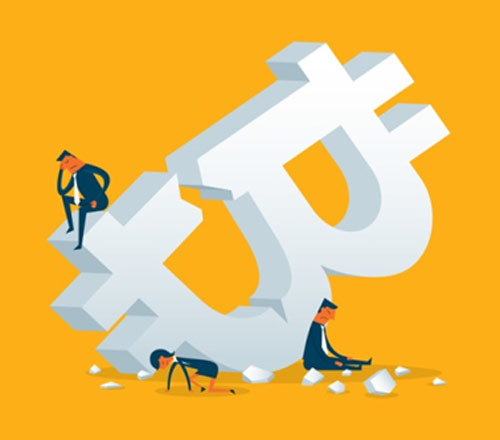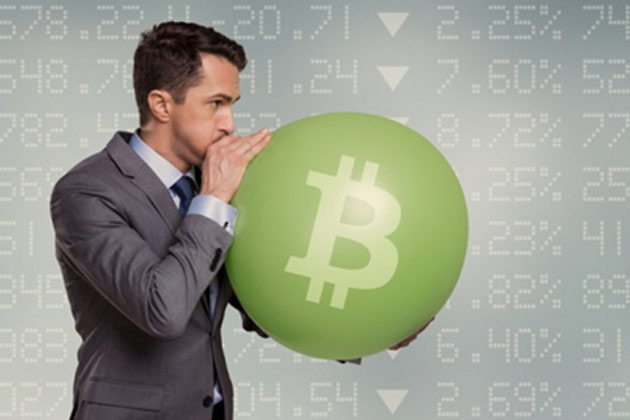| -- | January 23, 2018 How Inflation Might Hit Bitcoin By Patrick Watson You know that awful feeling when you think you lost your wallet? Now imagine you had $75 million in it. What would that feel like? Fortunately, I don’t know, but some unlucky people do. They’ve lost access to the digital wallets that hold their bitcoins—and without it, their cryptocurrency windfall is gone forever. Or is it? This is a deeper mystery than it may seem, with some unexpected conclusions I’ll describe below. 
Photo: Getty Images But before I forget, John Mauldin has recorded a short video message regarding our upcoming Strategic Investment Conference in San Diego, March 6–9. Having been to many investment conferences, I think the SIC is the most fun and most informative I’ve ever attended. You really should go. Watch John’s video and he’ll tell you more.  Now back to bitcoin... Cash in the Trash Somewhere in the Newport, Wales garbage dump is a computer hard drive that local resident James Howells discarded in 2013. He had spilled lemonade on it and thought it wasn’t worth fixing. Howells forgot that the hard drive contained the codes to access some bitcoins he had “mined” beginning back in 2009. He had about 7,500 bitcoins, worth $75 million assuming a $10,000 bitcoin price. Howells naturally wants to recover the lost device. He’s offered the Newport council 10% of the proceeds if it will let him dig into the landfill. So far the answer is “no.” Stories like Howells’ are popping up everywhere. People who mined or purchased bitcoins, sometimes years ago, can’t access it. The reasons vary: some forgot the password, others lost the memory stick, or their hard drive with the codes on it crashed. Some people died unexpectedly and took their passwords to the grave. Whatever happened, a lot of value is missing as bitcoin’s price zooms higher. Some of the desperate would-be millionaires have even tried hypnotism to recover forgotten passwords. Others are hiring hackers (honest ones, hopefully) to rifle through their files for clues. And these individual owners are only the first level. The accumulated pile of inaccessible bitcoins could lead to systemic consequences. 
Source: Getty Images Phantom Bitcoin Bitcoin’s anonymous inventor(s), Satoshi Nakamoto, designed the program to allow mining of only 21 million bitcoins by the year 2140. Miners have dug up about 17 million bitcoins in total so far. A study last year by digital forensics firm Chainalysis estimated that somewhere between 2.78 million and 3.79 million bitcoins are lost. That means as much as 22% of the existing bitcoin supply might as well not exist. For all practical purposes, it’s gone. The real bitcoin supply that is available for transactions isn’t 17 million—it’s 17 million minus those lost millions. So maybe as little as 13.21 million, using the higher Chainalysis estimate. Does that affect the bitcoin price? It should. Imagine if these were shares of stock, and the company bought back two or three million of 17 million outstanding shares. The price would rise because supply dropped. But are the lost bitcoins really lost? For some of them, we can’t be sure. 
Source: Getty Images Satoshi’s Million “Satoshi” mined some 1 million initial bitcoins. They’re on the blockchain ledger, so we know Satoshi hasn’t touched them. We don’t know who Satoshi is, whether he/she is still alive, or whether he/she still has access to those one million bitcoins, or may have given access to others. Satoshi might even be a group of people. In any case, Satoshi’s stash represents 5.9% of existing bitcoin supply. Their existence affects the value of all bitcoins… but maybe it shouldn’t, if a bus hit Satoshi and they are effectively gone. But Satoshi is/was pretty clever. Maybe some time-delay mechanism will distribute the one million bitcoins to Satoshi’s favorite people on a designated date. Or maybe Satoshi will retire and finally liquidate them next year. We can’t assume they are permanently gone. Similarly, many of those other “lost” bitcoins may not remain so. Maybe that council in Wales will let Howells dig for his hard drive, and he’ll find it. If so, the total bitcoin supply won’t change, but the available supply will rise. Or maybe scientists will invent brain-computer interfaces that let people recover forgotten passwords. Available bitcoin supply will then grow some more. 
Source: Getty Images The law of supply and demand applies everywhere, even to bitcoin. More bitcoins in circulation means more bitcoins available when someone tries to buy bitcoins with dollars, yen, gold, or whatever. In theory, at least, that should have a bearish influence on the bitcoin price. Sound familiar? It’s what we would call “inflation” in a fiat currency. The value of each dollar drops as more dollars enter circulation. | “I was skeptical when you claimed it was the ‘best conference,’ but after last year, I couldn’t praise the SIC enough.” Interested in attending 2018’s premier investment gathering? Reserve your seat now! |
Bitcoin’s Float So bitcoin is vulnerable to a kind of inflation. Granted, it’s less vulnerable than a fiat currency, thanks to that hard supply limit of 21 million. Central banks have no such limits. They can debase their currencies to nothing, as is happening in Venezuela right now. A better comparison might be shares of stock. Companies know exactly how many shares they’ve issued and retired, so they can always tell you the number “outstanding.” There’s also something called “float,” which is the outstanding shares minus restricted shares that owners can’t yet sell. Float is the tradable inventory. Then there’s a “fully diluted” share quantity: outstanding shares plus the new shares the company would have to issue if all option holders—typically employees or early investors—exercise them. We can map those same concepts to bitcoin. - Outstanding bitcoin is the number that have been mined, around 17 million.
- Bitcoin’s float is 17 million minus Satoshi’s million and all those “lost” bitcoins—maybe as little as 12.2 million.
- Fully diluted bitcoin is 21 million, which can’t happen until the year 2140.
The bitcoin float could unexpectedly increase if Satoshi sells his/her million or owners recover significant quantities of “lost” bitcoins. 
Source: Getty Images This would look much like the share dilution when a company issues new equity. Usually, the share price drops. That may never happen to bitcoin, but it’s not impossible. That means bitcoin buyers and sellers should consider it in their valuation. The broader point: Bitcoin has a kind of inflation risk. Just like monetary inflation, this risk grows with time. The longer people search for lost bitcoins, the more likely they’ll find some. Technology will be giving them better tools as time passes too. Bitcoin has many risks, so this is a relatively minor one. It’s small, but above zero. Small risks add up when trading stocks, bonds, or currencies. The traders who survive are the ones who watch for them. Bitcoin traders should take note. See you at the top,  Patrick Watson P.S. If you’re reading this because someone shared it with you, click here to get your own free Connecting the Dots subscription. You can also follow me on Twitter: @PatrickW.  | Subscribe to Connecting the Dots—and Get a Glimpse of the Future
We live in an era of rapid change… and only those who see and understand the shifting market, economic, and political trends can make wise investment decisions. Macroeconomic forecaster Patrick Watson spots the trends and spells what they mean every week in the free e-letter, Connecting the Dots. Subscribe now for his seasoned insight into the surprising forces driving global markets. |
 Senior Economic Analyst Patrick Watson is a master in connecting the dots and finding out where budding trends are leading. Patrick is the editor of Mauldin Economics’ high-yield income letter, Yield Shark, and co-editor of the premium alert service, Macro Growth & Income Alert. You can also follow him on Twitter (@PatrickW) to see his commentary on current events. Senior Economic Analyst Patrick Watson is a master in connecting the dots and finding out where budding trends are leading. Patrick is the editor of Mauldin Economics’ high-yield income letter, Yield Shark, and co-editor of the premium alert service, Macro Growth & Income Alert. You can also follow him on Twitter (@PatrickW) to see his commentary on current events.
Share Your Thoughts on This Article

Use of this content, the Mauldin Economics website, and related sites and applications is provided under the Mauldin Economics Terms & Conditions of Use. Unauthorized Disclosure Prohibited The information provided in this publication is private, privileged, and confidential information, licensed for your sole individual use as a subscriber. Mauldin Economics reserves all rights to the content of this publication and related materials. Forwarding, copying, disseminating, or distributing this report in whole or in part, including substantial quotation of any portion the publication or any release of specific investment recommendations, is strictly prohibited.
Participation in such activity is grounds for immediate termination of all subscriptions of registered subscribers deemed to be involved at Mauldin Economics’ sole discretion, may violate the copyright laws of the United States, and may subject the violator to legal prosecution. Mauldin Economics reserves the right to monitor the use of this publication without disclosure by any electronic means it deems necessary and may change those means without notice at any time. If you have received this publication and are not the intended subscriber, please contact [email protected]. Disclaimers The Mauldin Economics website, Yield Shark, Thoughts from the Frontline, Patrick Cox’s Tech Digest, Outside the Box, Over My Shoulder, World Money Analyst, Street Freak, Just One Trade, Transformational Technology Alert, Rational Bear, The 10th Man, Connecting the Dots, This Week in Geopolitics, Stray Reflections, and Conversations are published by Mauldin Economics, LLC. Information contained in such publications is obtained from sources believed to be reliable, but its accuracy cannot be guaranteed. The information contained in such publications is not intended to constitute individual investment advice and is not designed to meet your personal financial situation. The opinions expressed in such publications are those of the publisher and are subject to change without notice. The information in such publications may become outdated and there is no obligation to update any such information. You are advised to discuss with your financial advisers your investment options and whether any investment is suitable for your specific needs prior to making any investments.
John Mauldin, Mauldin Economics, LLC and other entities in which he has an interest, employees, officers, family, and associates may from time to time have positions in the securities or commodities covered in these publications or web site. Corporate policies are in effect that attempt to avoid potential conflicts of interest and resolve conflicts of interest that do arise in a timely fashion.
Mauldin Economics, LLC reserves the right to cancel any subscription at any time, and if it does so it will promptly refund to the subscriber the amount of the subscription payment previously received relating to the remaining subscription period. Cancellation of a subscription may result from any unauthorized use or reproduction or rebroadcast of any Mauldin Economics publication or website, any infringement or misappropriation of Mauldin Economics, LLC’s proprietary rights, or any other reason determined in the sole discretion of Mauldin Economics, LLC. Affiliate Notice Mauldin Economics has affiliate agreements in place that may include fee sharing. If you have a website or newsletter and would like to be considered for inclusion in the Mauldin Economics affiliate program, please go to http://affiliates.ggcpublishing.com/. Likewise, from time to time Mauldin Economics may engage in affiliate programs offered by other companies, though corporate policy firmly dictates that such agreements will have no influence on any product or service recommendations, nor alter the pricing that would otherwise be available in absence of such an agreement. As always, it is important that you do your own due diligence before transacting any business with any firm, for any product or service. © Copyright 2018 Mauldin Economics | -- |
